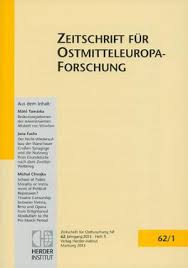Ein jüdisches Bildungsprojekt im lokalen Raum Rigas. Die Institutionalisierung jüdischer Aufklärung in Riga um 1900 und die Zielutopien der Gründer der Rigaer Abteilung des Vereins zur Verbreitung von Bildung unter den Juden in Russland
A Jewish project of Bildung in the urban space of Riga. The institutionalization of Jewish Enlightenment in Riga on the eve of the 20' Century and the visions of the founders of the Riga branch of the Society for the Promotion of Enlightenment among
Author(s): Felix HeinertSubject(s): Jewish studies, Recent History (1900 till today), 19th Century, Inter-Ethnic Relations
Published by: Verlag Herder-Institut
Keywords: Jewish project of Bildung; urban space of Riga; institutionalization of Jewish Enlightenment; 20' Century; Society for the Promotion of Enlightenment among the Jews of Russia;
Summary/Abstract: The historiographies of the multiethnic and multiconfessional society of the czarist (late imperial) Riga do not reflect anymore the obviously apologetic strategies and animosities, which where characteristic of the writings on Baltic history for a long time. Yet, the long tradition of the divided national historiographies seems to fit into a new paradigm which constructs an image of a multiethnic city on the periphery of the Russian Empire by conceptionalizing the history of Riga before 1914 as a history of a relatively peaceful coexistence of several ethnic Segments. This concept suggests that the history of Riga before 1918 should be understood as a history of coexistence of parallel ethnic worlds ("the Riga of the Latvians", "the Riga of the Germans", "the Riga of the Jews", etc.). There are certainly some well-known arguments for this perspective. Yet, this article pleads for a re-evaluation of the multiethnic history of Riga and the Baltic region and the historicization of the key concepts. The article underscores the need to question the mentioned concept from two sides. First, the conceptionalization of the history of Riga along the ethnic "borders" and "lines" is questionable if one is interested in those spheres of life, interactions, cooperations, interrelationships, coalitions, conflicts, interdependences, etc., which do not (solely) fit into the ethnic "scheme" of Riga suggested by the concept. Second, the mentioned conceptionalization is questionable from a non-"essentialist" view on history that focuses on the processes of construction of collective identities, which is one of the key interests and theoretical challenges ofthe modern historiography since at least two decades. The author questions some ostensible certainties and thus doubts whether there was one Jewry respectively one Jewish milieu in Riga before 1900. And he suggests to analyse the formation of the Riga branch of the "Society for the Promotion of Enlightenment among the Jews of Russia" as an attempt to construct a modern Jewish identity. Moreover, he argues that the visions, the mission, the activities and the internal structures of the Riga branch of the society should be analysed not only or primarily in terms of "Jewish history", but, for instance, also in the analytical framework of the cultural and social history of the middle classes (Bürgertumsforschung). This approach should include the analytical concept of inclusion and exclusion. By analysing the vision and the mission of the society, it becomes clear that the Riga "architects" of a new Jewry projected a broad concept of Bildung onto what they called "Jewish masses". The institutional framework of the society enabled the coexistence, Cooperation and sometimes even Integration of quite different ideological and (proto-)political views. The author decisively rejects the thesis that the history of Eastern European Jews in general and the Riga "Jewry" in particular after 1881 can be best understood as the (pre-)history of Zionism (as the consequence of failed integration). The Riga branch of the "Society for the Promotion of Enlightenment among the Jews of Russia" was not a Zionist society. Finally, the author argues in favor of a link between a social and cultural history of ideas. Such an approach implies an analysis of alternative, complementary and competing ideas, visions and projects, an analysis of the multipliers and recipients of ideas, a focus on dynamics and social effects of ideas. Thus he pleads for a consequent re-evaluation of the above criticised a priori (essentialist) assumptions and, generally, for the confrontation of the Baltic (not only Baltic-Jewish!) history and historiography with theoretical interests, concepts and methodological Instruments, which have been developing since the 1980s.
Journal: Zeitschrift für Ostmitteleuropa-Forschung
- Issue Year: 56/2007
- Issue No: 1
- Page Range: 1-49
- Page Count: 49
- Language: German

